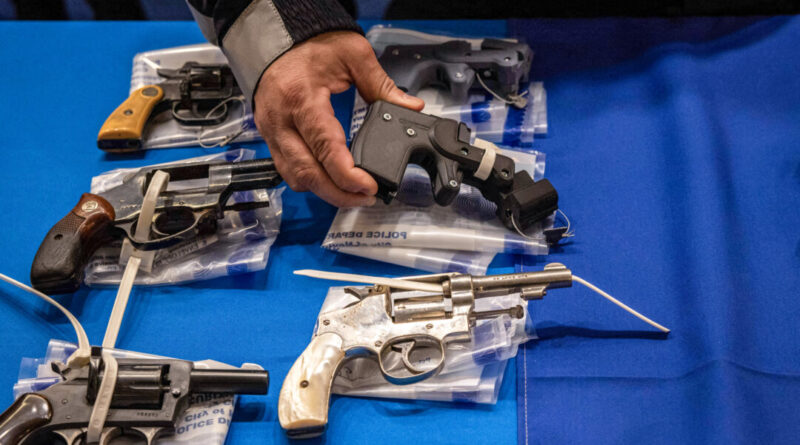Oregon Lawmakers and Courts Consider Stringent New Gun Regulations
The Oregon legislature is currently discussing three new gun bills while the Oregon Supreme Court examines the status of a ballot measure that has been on hold since 2022.
The ongoing clash between firearm safety regulations and gun rights is intensifying in Oregon.
The Oregon Supreme Court now holds the fate of Ballot Measure 114, which has experienced legal challenges since its approval by voters in 2022.
This measure is widely regarded as one of the most stringent gun laws in the country.
Democratic lawmakers, who control both legislative chambers, are not waiting for a judicial decision. Instead, they are pushing forward with three firearm safety bills.
This bill proposes to prolong the time a “permit agent” has to issue or deny permits and raise application and renewal fees from $65 to $150.
“It’s time to see its impact.”
During the testimony, Republican state Rep. Alek Skarlatos expressed opposition, criticizing the proposed $150 permit fee and $110 renewal fee as discriminatory towards low-income individuals, who he argued are more likely to rely on firearms for self-defense.
“A $300 rifle will now cost $450, in addition to the $48 background check fee,” he said.
The bill would also double the time allowed for the state to process a permit application from 30 to 60 days.
Despite having supported many gun violence prevention measures in the past decade, Democrat Rep. Paul Evans diverged from his party by labeling HB 3075 “an assault on underprivileged Oregonians” in his April newsletter.
State Licensing for Dealers
Bill 3076 would instruct the Oregon Department of Justice to develop a state licensing program for gun dealers, with fees reaching as high as $1,500 annually and potential increases of 20 percent each year.
Currently, Oregon firearm dealers are licensed by the Bureau of Alcohol, Tobacco, and Firearms (ATF) and are required to obtain a Federal Firearms License (FFL) without additional state licensing.
Under HB 3076, an ATF-issued valid FFL would no longer suffice to operate a gun store in the state.
All stores and home-based FFLs would be mandated to install digital video surveillance systems that continuously record whenever a customer is present.
Gun transfers would need to be documented on video, with a mandatory retention period of three years.
Employees of FFLs who handle firearms or ammunition would need to complete a state-certified training course, yet to be designed, and participate in annual refresher training.
“As amended, HB 3076 imposes unreasonable and severe new restrictions on gun dealers in a bid to close as many firearms businesses as possible,” commented the Oregon Firearms Federation to The Epoch Times.
“However, the new regulations will also affect home-based FFLs and apply at gun shows, where compliance will be nearly impossible.”
Oregon House Republicans condemned both bills, asserting they infringe upon the rights of law-abiding citizens to bear arms without addressing crime reduction or public safety concerns.
“These bills target the constitutional right to bear arms,” declared House Minority Leader Rep. Christine Drazan in a media statement on April 8.
“The only consequence of these bills is punishing lawful gun owners and small businesses that are compliant with federal laws.”
Evans once again disagreed with his party, affirming that he is “strongly against” all pending gun legislation in Oregon.
“The intensity behind advancing these measures has led me to seriously reconsider my political allegiance,” he remarked in his newsletter.
Meanwhile, in the Senate …
Introduced by Democrat Sen. Floyd Prozanski, Senate Bill 243 would enforce a 72-hour waiting period for gun purchases after a buyer clears a background check.
“The initial part of this law is intended to prevent suicides or domestic violence,” Prozanski stated, emphasizing the need for a delay for individuals experiencing “heightened emotions.”
“It gives them time to reconsider their actions before attempting suicide or acts of domestic violence.”
Evans argued that the three-day waiting period post-background check is a “loss of freedom.”
“Why should we accept a three-day waiting period for purchasing a car, receiving alcohol, or acquiring reproductive healthcare?”
Tracking Measure 114
Voters passed Ballot Measure 114, mandating a permit for purchasing a firearm, with a narrow 50.75 percent majority. The measure remains suspended pending legal challenges.
Under this measure, prospective buyers must successfully complete a criminal background check and a gun safety course to receive their purchasing permit.
Additionally, they must demonstrate that they pose no danger to themselves or others.
If enacted, this measure would eliminate the “Charleston Loophole,” which currently permits firearm transfers to proceed if background checks are not completed within three days.
Furthermore, it limits magazines capable of holding or being modified to hold more than 10 rounds.
A judge in Harney County ruled in November 2023 that Measure 114 was unconstitutional under state law.
Contrasting that decision, a three-judge panel of the Oregon Court of Appeals concluded in March that the measure does not violate the Oregon Constitution’s right to bear arms.
On April 14, two Harney County gun owners, the plaintiffs, asked the Oregon Supreme Court to consider their case.
The plaintiffs assert that the requirement to obtain a permit in order to purchase a firearm effectively transforms a constitutional right into a privilege subject to governmental approval.
“Ultimately, the supreme court will choose to either hear or dismiss our case, or the legislature may enact HB 3075,” one of three bills introduced in the state legislature in January, he elaborated.
“Oregonians voted for this measure, and it’s time for us to implement sensible safety protocols,” Rayfield stated.
State regulations mandate secure storage of firearms when not under the owner’s immediate control, ban guns in the state capitol, and grant colleges and universities authority to prohibit firearms on their campuses.
In 2023, the state enacted restrictions on untraceable “ghost guns” and 3D-printed firearms.




